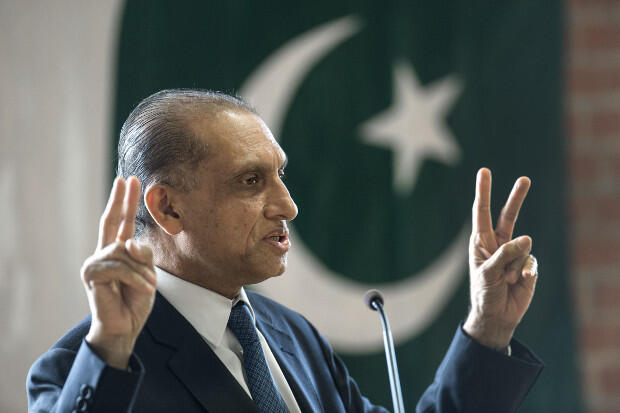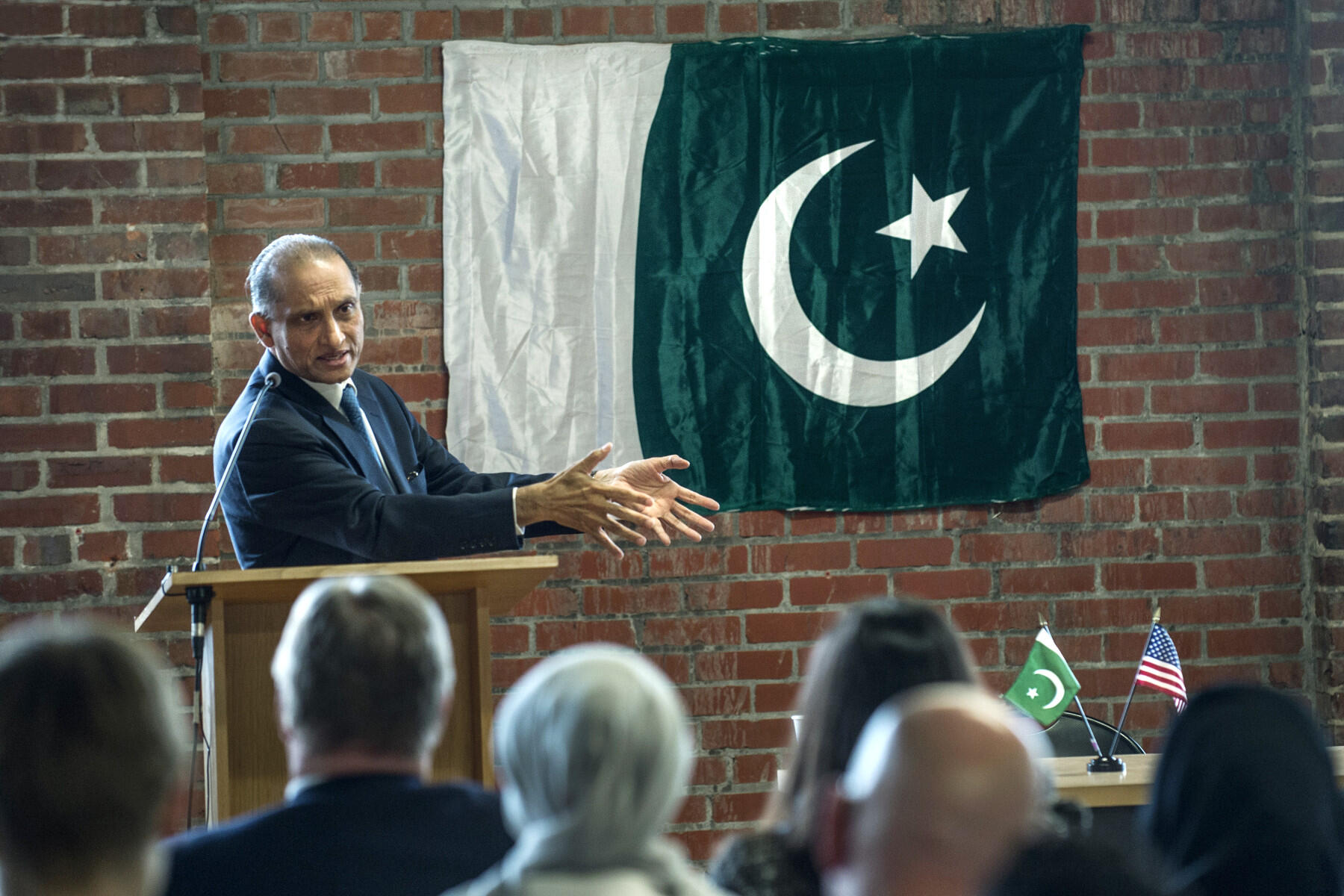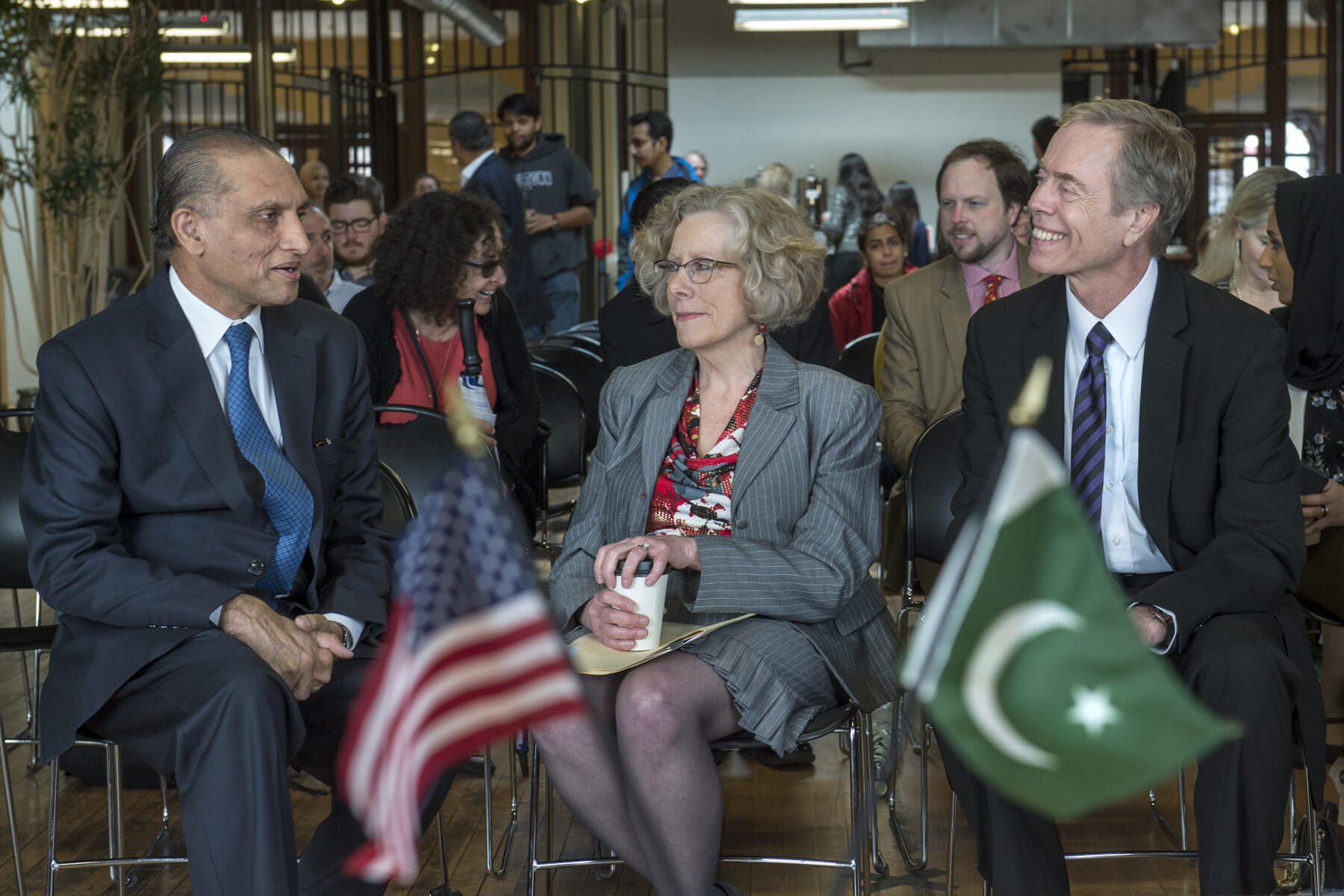
April 17, 2018
At VCU, ambassador says Pakistan’s relationship with U.S. is strained over Afghanistan strategy
Share this story
The relationship between the United States and Pakistan is going through a “bad patch,” primarily because of disagreements over how best to stabilize Afghanistan, according to Aizaz Ahmad Chaudhry, the ambassador of Pakistan to the United States, who spoke Monday at Virginia Commonwealth University.
“Other than Afghanistan, I don't think we have much issue with the United States at this point in time,” Chaudhry said. “In Afghanistan, our objectives are the same. It's only a matter of reconciling our strategies and I think we are innovative enough to do that. I am very confident that this relationship – which may be passing through a stressful period now – will come back.
“A win-win solution would be for our two countries to continue to cooperate,” he said.
Chaudhry spoke on “The Future of U.S.-Pakistan Relations” at The Depot on Broad Street in a talk hosted by the Hubert H. Humphrey Fellowship Program in the Department of Psychology in the College of Humanities and Sciences? and the VCU Global Education Office.
Chaudhry’s visit to VCU underscores the university’s commitment to global education, said Montserrat “Montse” Fuentes, Ph.D., dean of the College of Humanities and Sciences, who introduced the ambassador at Monday’s event.
“VCU, our institution in recent years has absolutely placed a priority on internationalization,” she said. “We believe that it's critical for our students, for our faculty to learn about different cultures, and to work to make contributions that make a difference, not just on the local scale, but on the global stage.”
While Pakistan and the United States disagree on the strategy, Chaudhry told the crowd, both countries want to see Afghanistan stabilized.
“The security situation is deteriorating. People are getting impatient,” he said. “It's already been a long haul for your country. Six hundred and eight billion dollars already spent and $21 billion [in] recurring costs per year on the horizon. You have paid not only in treasure, but also in blood. And therefore, the United States has a legitimate interest in seeing Afghanistan stabilized.”
Pakistan, which shares a long porous border with Afghanistan, knows its gains in security and counterterrorism will remain tentative unless its neighbor is peaceful.
“We want to see Afghanistan stabilized yesterday,” he said. “But it's easier said than done.”

The source of the tension and disagreement is rooted in what Chaudhry characterized as an outdated and incorrect assessment of Pakistan.
“How is it that the United States does not trust Pakistan?” he said. “There's a perception in the United States that we are not making progress in Afghanistan because Pakistan is supporting Taliban and Haqqanis. ... That perception is based on an estimation, which we think is dated.”
Over the past several years, he said, Pakistan has come to a political consensus that terrorism, extremism and violence under any name or under any pretext is not acceptable. And the country’s military has secured tribal areas that once served as hideouts for militants.
“There is no safe haven [for militants] in Pakistan. And for the last 10 months, we are saying: If there is one, please tell us where it is. If there is one, we would like to go with you or go ourselves to eliminate that,” he said. “Because having them in our country, the Taliban or the Haqqanis, have brought stress to our relationship with your country.”
“The worldview that the Taliban have is not a worldview the people of Pakistan share,” he added. “And if the Taliban come to power by force in Kabul, that is not in my country's interest."
Pakistan, he said, experienced little terrorism until it joined the U.S.-led coalition against terrorism and al-Qaida after the Sept. 11 terrorist attacks.
“We became a legitimate target in the eyes of these militant groups. All hell broke loose in Pakistan from 2003 to 2014. Hardly a day would pass when we would not have an attack on one institution or another,” he said. “There was a count of 150 terrorist incidents per month, on the average, during that period.”
Now, he said, Pakistan’s focus on rooting out extremists has resulted in a dwindling number of attacks.
“The figure of 150 incidents of terrorism in a month on average has come down to fingers of a single hand. We are very proud of this achievement,” he said. “Is our job done? No, not yet. Because that mindset that gives rise to extremist behavior still exists. And we've got to address that.”
In August 2017, President Donald Trump announced a revised strategy for the United States’ war in Afghanistan. In his speech, he said the U.S. would send additional troops to Afghanistan and said the U.S. would pressure Pakistan on giving “safe haven to agents of chaos, violence and terror.”
“In the past, Pakistan has been a valued partner. Our militaries have worked together against common enemies. The Pakistani people have suffered greatly from terrorism and extremism. We recognize those contributions and those sacrifices,” Trump said. “But Pakistan has also sheltered the same organizations that try every single day to kill our people. We have been paying Pakistan billions and billions of dollars at the same time they are housing the very terrorists that we are fighting. But that will have to change, and that will change immediately.”
Chaudhry, however, disagreed that a military strategy to secure Afghanistan is possible.
“For Afghanistan, we don't a need a military solution. Because a military solution does not exist,” he said. On Aug. 21 of last year, Trump said the U.S. “will stay in Afghanistan for as long as it is required to stabilize it. ... He gave more authority to U.S. troops to engage the militants. Many perceived that as a military solution. And in 2017, according to U.S. sources, three times as many munitions were dropped on Afghanistan as compared to 2016.”

Chaudhry said Pakistan’s position is that a comprehensive political solution – with political reconciliation and border security as its centerpiece – is the only path forward for Afghanistan.
“While you may hold Pakistan responsible, we may be projected as a boogeyman that explains why Afghanistan is not making progress,” he said. “But scapegoating Pakistan will not fix Afghanistan. What will fix Afghanistan is a comprehensive political approach.”
Beyond Afghanistan, Chaudhry said, the U.S. and Pakistan remain close partners with strong connections on education, health, agriculture, commerce and trade, information technology, counterterrorism, defense and more.
He cited programs such as VCU’s Hubert H. Humphrey Fellowship Program, which is sponsored by the U.S. Department of State’s Bureau of Educational and Cultural Affairs. The international exchange program brings accomplished professionals to the U.S. from Africa, Asia, Latin America, the Caribbean, the Middle East, Europe and Eurasia.
“The United States remains one of the most important relationships for my country,” he said. “It has always been. And I am convinced that it will always remain so.”
Subscribe to VCU News
Subscribe to VCU News at newsletter.vcu.edu and receive a selection of stories, videos, photos, news clips and event listings in your inbox.










